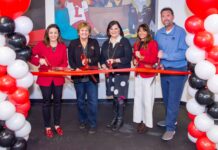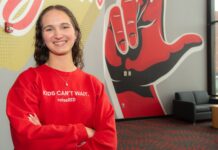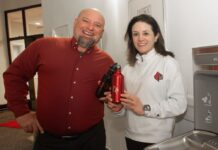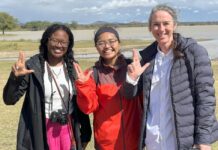Imagine visiting a hospital where advanced robots are interacting with patients, accessing electronic health records and helping busy nurses perform their daily duties.
This is just one of the visions of Dan Popa, PhD, a University of Louisville professor and the Vogt Endowed Chair of Advanced Manufacturing, who is at the forefront of understanding how robots and humans will work together in the future.
For more than a decade, Popa pursued his research initiatives at the University of Texas at Arlington. Then, in January of this year, he joined the J.B. Speed School of Engineering to further his groundbreaking work and seek out a path to commercialization.
His Next Gen Systems (NGS) research group, which is comprised of grad students, undergrad students, grad scholars and other young research professionals at UofL, now operates in three labs on the Belknap Campus. Together, they are exploring the latest in human-robot interaction, including overall physical designs and pressure-sensitive skins that are safe for personal contact.
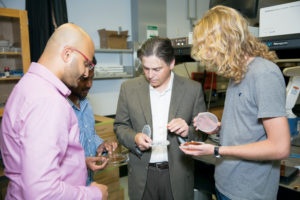
“I joined Dr. Popa’s team because of the excellence, passion, collaborative nature and progressive open-mindedness that he inspires,” said Josh Baptist, a research & development specialist with NGS who followed Popa to UofL to study electronic skin.
Popa also received a grant from the National Science Foundation’s Partnerships for Innovation: Building Innovation Capacity (PFI:BIC) program. This partnership allows his team to collaborate with industry leaders and study robotics technology in everyday settings to help identify market needs.
NGS now partners with defense contractors RE2 Robotics and QinetiQ (who developed robots used to disassemble improvised explosive devices in Iraq and Afghanistan) and Texas Health Resources. New avenues are also being explored at the UofL Schools of Medicine and Nursing and University of Louisville Hospital to test any lab-created technologies in relevant environments.
One of Popa’s most prominent research projects funded by this grant involves
robot nurses’ assistants. And he believes this is great news for everyone in
the health care industry.
“These robots are not designed to replace nurses, but to help eliminate
mundane tasks so that nurses can focus on more important duties and provide better care for their patients,” Popa said.
The assistants can perform observational functions, such as determining whether a patient is sleeping or sitting, around the clock. They can also interpret verbal commands from a patient, to bring a glass of water or a remote control, for example.
Popa has learned that it is critically important for these robot nurses’ assistants to adapt and customize their actions based on the specific needs of a patient instead of relying on pre-programming.
“When taking patients for a routine walk or moving IV poles,” he said, “the robot needs to recognize and match the patient’s desired pace in order to be successful.”
These robot nurses’ assistants also will be able to provide a wide range of additional services for health care facilities, such as transporting medical equipment and beds from one room to another, taking basic vital signs and alerting staff if a patient needs assistance.
Beyond his research goals, Popa is focused on future commercialization opportunities as he brings his advanced robotics into the public sector. This helped his decision to join UofL for several reasons.
First, the strong reputation of UofL’s Department of Electrical and Computer Engineering and the quality of the undergrads within the current Speed School programs were important to him. He also knew that the state-of-the-art Micro/Nano Technology Cleanroom (MNTC) — a $30 million facility in the John W. Shumaker Research Building — and the Rapid Prototyping Center’s world-leading capabilities in additive manufacturing would be key to quickly bringing his products to market.
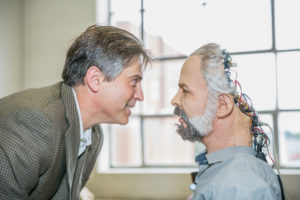
An active start-up culture across the city of Louisville along with open opportunities for commercialization was very appealing as well. He was already aware of several small companies that had experienced commercial success similar to what he hoped to achieve here in the same short amount of time.
So, with everything UofL has to offer, when can we expect to see Popa’s vision become a reality?
“If they are proven to be reliable and cost-effective, these robot nurses’ assistants may only be about five to 10 years away from real-world hospital applications,” Popa said.
Beyond that, he believes that robot personal assistants may soon become a common appliance in homes around the world. One thing is for certain, though. The addition of Popa has had a tremendous impact on everyone around him.
“Dr. Popa’s expertise in both macro- and micro-scale robotics adds a lot of value to the Speed School,” said Sumit Kumar Das, PhD candidate and NGS team member, “and his research projects and industrial connections are important to the University of Louisville.”
Dan Popa, PhD
• Vogt Endowed Chair of Advanced Manufacturing in the Department
of Electrical and Computer Engineering, University of Louisville
• Head of Next Gen Systems (NGS) Research Group,
University of Louisville
• Founding Member, Texas Microfactory Initiative,
University of Texas at Arlington
• Affiliated Faculty Member,
UT Arlington Research Institute (UTARI), University of Texas
at Arlington
• Faculty Member, Electrical Engineering Department,
University of Texas at Arlington
• Research Scientist, Center for Automation Technologies, Rensselaer Polytechnic Institute
• PhD, Electrical Computer and Systems Engineering, Rensselaer Polytechnic Institute
• MS, Engineering, Dartmouth College
• BA, Dual Major in Engineering and Math with Minor in Computer Science, Dartmouth College
Popa has authored more than 100 referred publications and is an active member of the IEEE Robotics and Automation Society (RAS) Conference Activities Board,
the IEEE Committee.








